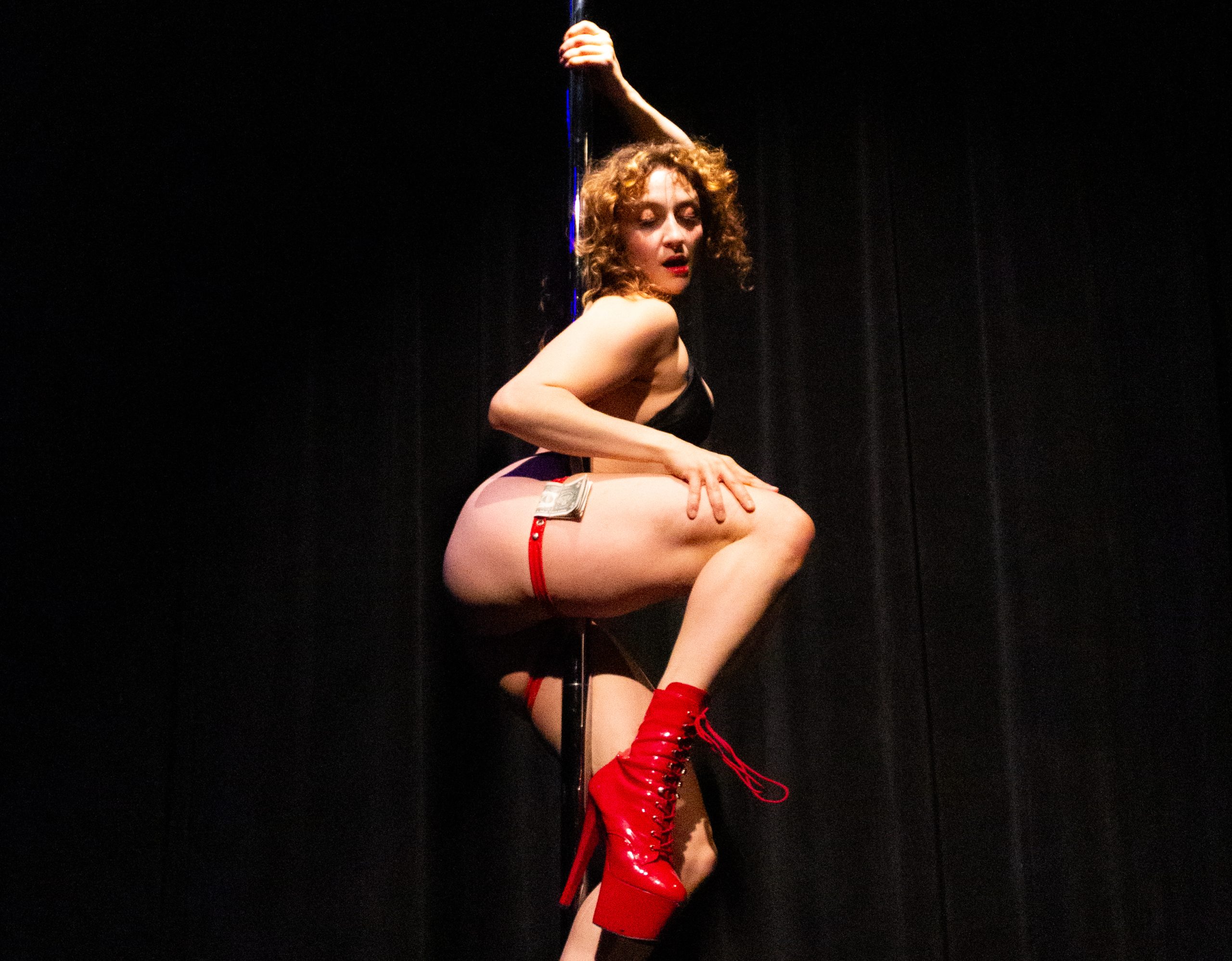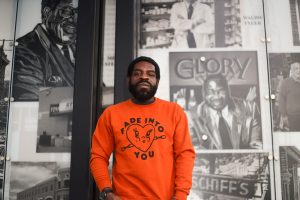With mugs of tea in hand, we settle into armchairs opposite each other in my sunroom. Time transforms during our conversation. In the delicate, heavy-eyed moment where day slumbers into night, Liv Rose comes alive.
Liv, the playwright and actress of They Are All Our Sons, holds many roles: actor, dancer, musician, writer, instructor, trainer, professor, and sex worker. While it’s hard to believe one person can shift into all those shapes, it’s clear that this part of her existence was necessary when creating her play because it is about holding multitudes.
They Are All Our Sons, a reinterpretation of the Greek myth of Medusa, is told through the lens of a modern-day strip club. Two dancers, Medusa and Athena, played by Liv and Abbie Warhus respectively, meet at the club, create a sister-like bond, and find themselves navigating sexual trauma and patriarchy. The tension of control and surrender pulls the viewer into considering the possibility of coexistence.
This interview has been edited for length and clarity.
* * *
Shivani Kumar: Medusa’s story has often been re-told from Perseus, a man’s point of view. He depicted her as a monster to slay. When writing this play, what did it mean to you to see Medusa as a hero rather than someone evil to overcome and destroy?
Liv Rose: It’s interesting [how] this question is phrased; I don’t know that I see her as a hero. We spent a long time in rehearsal analyzing Medusa’s flaws. Since this was a pro-Medusa story, we wanted to be vulnerable and transparent about her weaknesses. I tried to neutralize the story so she isn’t someone to put on a pedestal. Especially because women, especially in the strip club, are put on a pedestal as a goddess to be worshiped or monsters to be torn apart and slain. Even the goddess-worshiping side can feel distancing and dehumanizing. Sometimes people get so obsessive that it doesn’t feel like people appreciate [their] humanity or soul. It becomes something that is all about them.
SK: Before I saw the play, I re-read the story of Medusa from Perseus’s point of view. In that version, Medusa does not have the same agency as she does in your play. With heroes, it’s easy to forget their imperfections, because of how they inevitably make mistakes. The audience can get frustrated with them once the imperfections play out, but that makes them human. Through imperfections, we see how and where Medusa gains agency. That was something I really loved about the play.
LR: I’m not sure how the audience perceived [it]. My intention as the actor playing Medusa wasn’t telling the Medusa story. I was thinking that I was playing Medusa, the dancer, and the Medusa story unfolds around me. Obviously, [my] playwright and actor brain were working separately. I constructed the Medusa story around another smaller scale story about the strip club. It was also a bit of my personal story: about gaining agency over myself especially in the strip club environment. I think it became a perfect microcosm of Medusa‘s gaining agency in her story. Then as an actor, I’m playing this person who is Medusa, the dancer.
By the end of the play, Medusa breaks the fourth wall [by] talking about truth. [Then], she becomes conscious about the story. But it remains open to interpretation whether [or not] the character is aware that she is becoming Medusa from the myth.
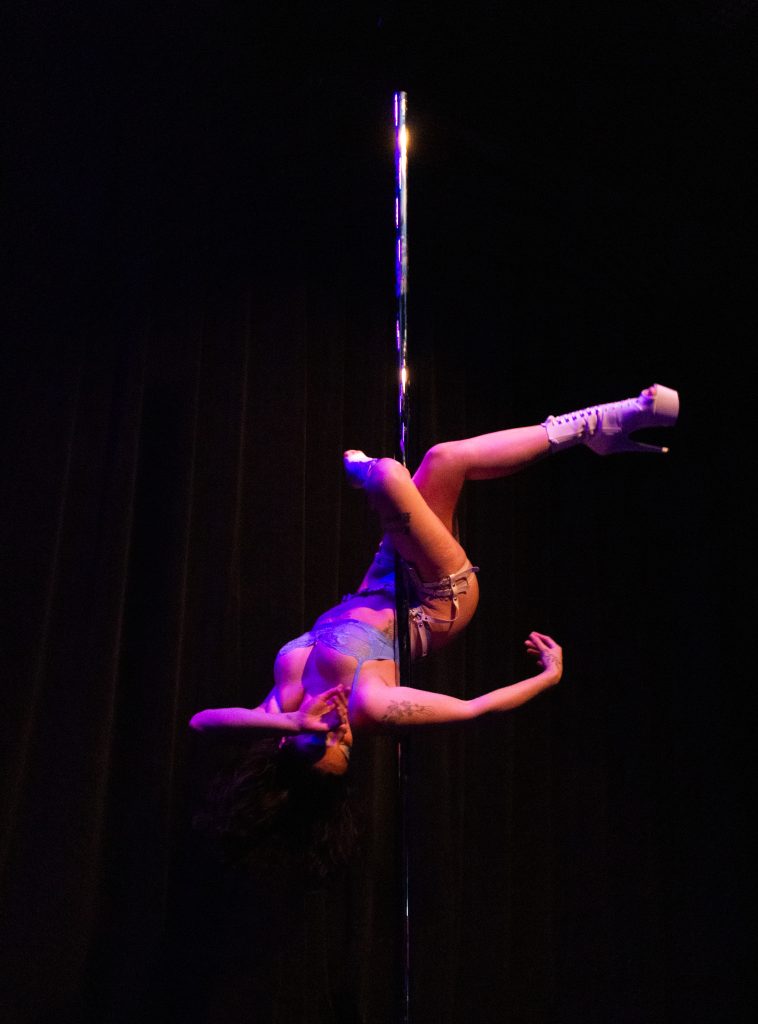
SK: Medusa and Athena have dealt with their sexual trauma differently, but what they share is this feeling of being immobile. How are there different ways of moving through their trauma and grief when establishing and affirming their agency as sex workers and people?
LR: [When writing this play], I needed to include Athena to show there are different ways people process sexual trauma because sexual trauma affects Athena and Medusa in different ways, it pushes them apart. Medusa somewhat needs a counterpart to externally process, while Athena pushes her away because she is triggering. Inadvertently, they almost create agency for themselves because Athena is pushing away from Medusa and Medusa is creating a space further distancing herself from her peers at work. In her personal life, I’d have to ask Abbie, the actress that played Athena, if she felt Athena found agency. I’m not sure she did. But for Medusa, finding agency in the club was a roadmap to finding it in her life. Again, I’m not sure she was finding it outside of the club. Her process was throwing herself into the fire and learning how to uphold her boundaries in this crazy environment and hoping it’d transfer to her personal life.
For Athena, the club was her world. There wasn’t a boundary between work and personal life. Power is so important to Athena in that space. [Her] perception is that she has power over the other girls [working at the club] since she has worked there a long time. She thinks she runs that shit. That’s what keeps her there rather than the experience with the men. Medusa is trying to be okay and at peace with not having power. Because she knows she doesn’t have power. She’s learning how to exist in that. And when you dial it back to Greek myth, well, Athena is a goddess and Medusa is half-mortal who lives in Athena’s home and worships Athena. She is the human in the story. She exists in that humanness that is a real struggle that we all face.
SK: Athena sees the club as a job. She believes that they are here to make money. While the men think we are here to fall in love with them, it’s our job to do that. Whereas, Medusa uses the club, like you said, as a framework for processing things for her personal life. She is more about humanizing them. And seeing the potential for growth and genuine interaction.
LR: Both [co]exist in me at all times. I’m constantly oscillating between the two. Some days at work [at the club], I see the purpose that Medusa was searching for: believing the spiritual connections with these people were fuel for change and healing. But then, how real is that? And that’s when Athena’s mindset creeps in. Then the questioning begins. Is this really intimate? Is this a good thing? It’s such a negative mindset. It’s hard to exist in that world when you’re Athena.
SK: I appreciate that they live within you. In a way, so much of Medusa is about surrender and Athena is about control. Both things keep us safe, but there are extremes to both.
LR: We don’t think it’s good to be either of the characters. We want to learn from both of them. That was a scary part of the process because I wrote and performed it. Since I said it in the playwright’s note, they will know it’s my story. But it also was separate from me. It is about a character who I strategically wrote from the story even though it is taken from my real life. At rehearsals, I’d remind everyone that I wasn’t playing me. I’m acting and performing. And they knew, but it was a helpful part of the process for me to verbalize [that] this was a story.
I needed some separation to show all the ugly parts of this story. It takes self-awareness because I know I have been those parts before. I see myself in Medusa. I also see myself in Athena, and those are some of the most shameful parts of my life that I carry so much guilt in. Athena is the embodiment of rejecting other women and victim-blaming [which is] boiled down from misogyny, from the patriarchy. And it is all internalized. We are each other’s worst weapons, and I have been that before. Both characters have really amazing qualities, but they have things you don’t want to embody.
SK: Power structures are a huge part of this play. Medusa and Athena. Medusa and her abuser. Medusa and her male clients at the club. What challenges did you face when writing the play when trying to shift those power struggles so Medusa could stand in her power and move away from being the newbie, naive, and scared?
LR: As survivors of sexual trauma, [sex workers] have been sexual people at some point in our lives. We aren’t just scared of sex. Most people would cringe at the thought of putting themselves in an environment like the strip club where being sexually assaulted is a risk for the job. I think every stripper has been sexually assaulted on the job. I would be surprised to hear if people haven’t. So everyone around you is experiencing sexual assault so it was a big turning point for Medusa to share that. She wants to work on this. She doesn’t want to be triggered all the time. She wants to be able to be this sexual being she once was or maybe never was but wants to become. The strip club is very forgiving of flaws because people are embracing the taboo. So there she could be raw in whatever she’s going through. She wasn’t very self-aware that she was triggering her friend, and that eventually led to their demise.
Part of gaining her agency was forming that sisterhood so she had a container to push into and have someone to externally process with. The performance of sexuality is a huge tool in overcoming sexual trauma—even if you’re not working at a strip club. Even taking a pole class—I was a pole student before I was a stripper. I took pole classes so I could walk into a strip club with confidence. Any form of sensual movement is where you can find that healing. Medusa and I decided to try it out in the environment of a strip club.
SK: It’s about not holding shame. But rather, seeing Medusa and Athena as extremes and trusting we can find that place in the middle. When there was a rift between Medusa and Athena, they found their way back to each other in a healthier middle ground.
LR: In that final locker room scene, where they share the banana, it looked like they made up. It was a really sweet moment between them, but you don’t know. There was some level of closure, but in the strip club, there’s some validity in never knowing if the interaction you just had is something you can lean on. That’s what’s sad about this story. They built this relationship of sisterhood. But at the end of it, they hurt each other so much. So this one moment at the end—is it truly okay?
The final moment of the show where Medusa is dancing and Athena watches is important because that was visually what I experienced for the entire play. The only thing that soothes the anxiety of wondering if the sisterhood or anything is real and valuable is watching the girls around you dance. No matter what, the dancing is moving freely and getting to witness that in each other. They can trust here.
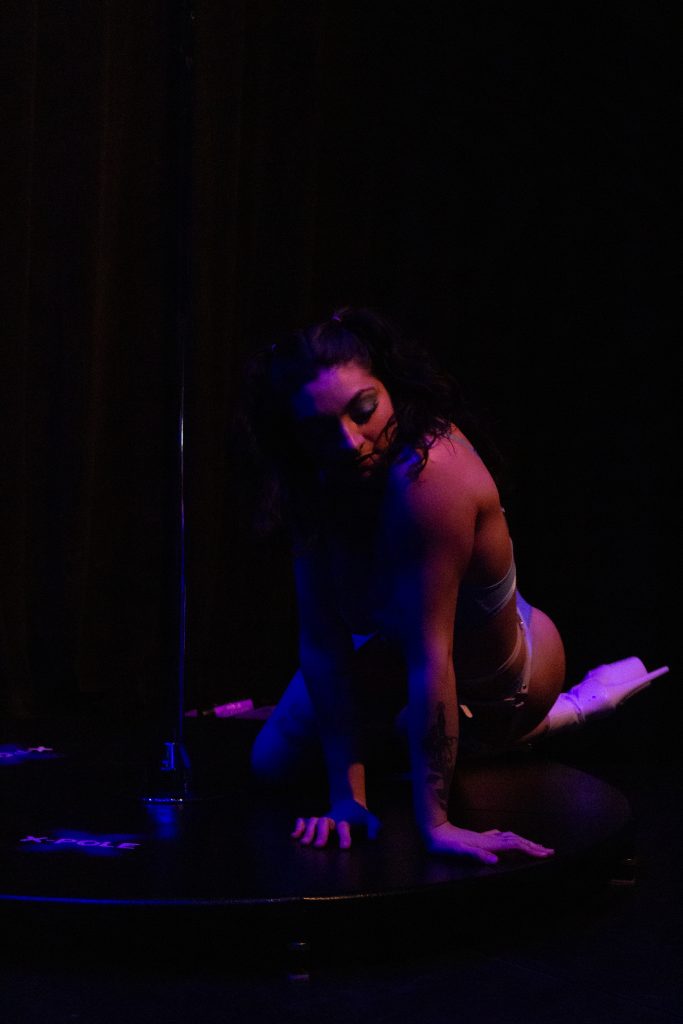
SK: I saw that moment as where the trust was beginning to be re-established; especially with a dance form like pole. If you’re going to dance doubles, there’s immense trust that goes into that: with yourself and your dance partner. I like to think this is just the beginning of them finding their way together but also on their own as separate people.
LR: We all wanted the end of the play to be open ended. This is a version of many people’s stories. I know so many people who have had different outcomes from the same kinds of experiences. It has to be open ended in that sense.
SK: Maybe, some parts of healing could only be found at the club.
LR: That moment was a shift for Medusa because she feels some control over the men because of the conversations with Athena. The experience she’s having with sexual assault and feeling beneath men—she is bringing it to the locker room with Athena who she is putting herself beneath because she’s trying to learn from Athena. She believes Athena has all the answers. I wanted them to play against and for each other. She is learning from Athena and applying it in real time. She’s practicing what Athena is telling her, and therefore, she feels control over the men, but she is also learning her own thing, through the experiences she’s having with these same men. Her truths are starting to contradict Athena’s truths. Then she begins to see maybe she isn’t beneath Athena—maybe she is as powerful. That’s what creates the separation on the min/max scale.
SK: When you see each other as humans, perhaps it is more possible for people to not get taken advantage of in vulnerable and intense moments. This does not sound like my high school theater productions. How did you and your team take care while writing, producing, and performing a play with such heavy themes? How do you have conversations with your team about safety, security, and respect?
LR: During the writing process, Jarred Webb and I would have meetings once a month for a few months. Jarred was very affirming on all my thoughts and help me dig through to the core. My experience is through trauma-informed care and using that as an actor to keep your body and mind safe during [an] intense processes. It was a good moment to practice what I teach. I was fresh off teaching a class at DePaul which included trauma-informed care. That was nice for me because I could reach back to systems to take care of my body and mind, including yoga.
After the show, I have been processing it because it truly took everything out of me. I’m excited to do it again now that I’ve done it, and I don’t think it will be as demanding the next time. But yeah, it was a lot. I just completed this great accomplishment, and I had to figure out how to make money because I could not work during that process. It was just so physically, emotionally, and mentally draining to do the show and keep my body safe, I had to be well-rested. It was crazy, you know? I did this great thing, but I wasn’t making money. I was an artist. After the show closed, I had to [return] to work because I was in financial survival mode.
I also have a decent amount of intimacy direction in theater. I’ve dipped my toes into it, but I want to dive in further. Jarred and I have a really good understanding of how to work intimacy into a show. As a director, he was so good in the room when we were doing those intimate scenes. Abbie and I had really strong communication with each other. At every rehearsal, we went through our boundaries of what’s okay to touch. It was great that Abbie and I had similar experiences because we are people who are free with our bodies, but we are also so on top of consent and making sure everyone feels safe. We worked well together.
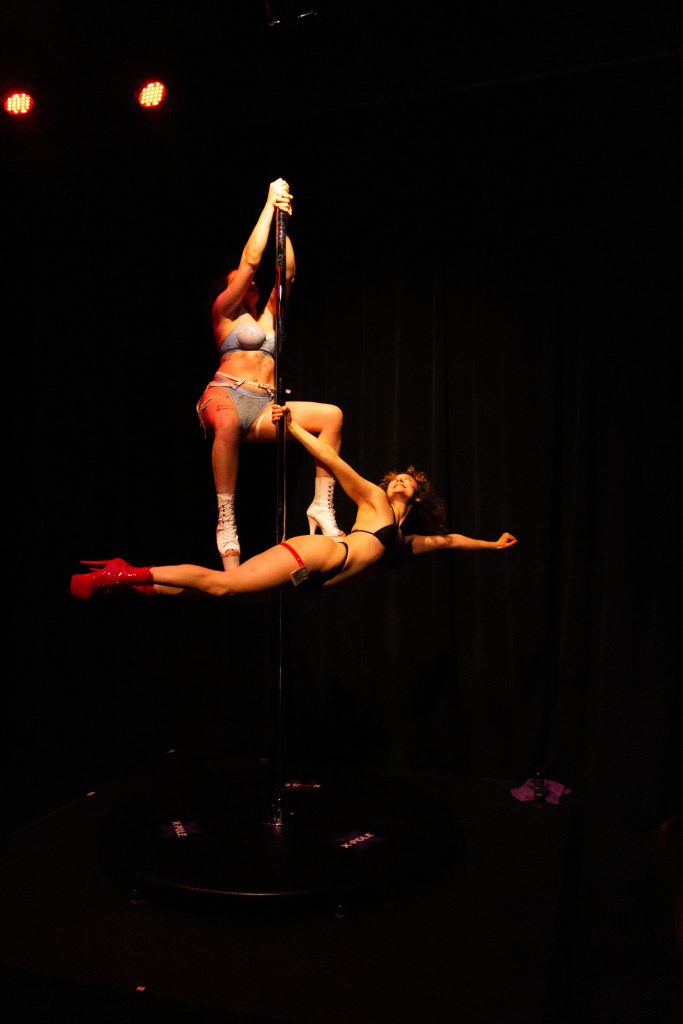
LR: Once we got into tech, it is a bit more intense so it’s great that there are people whose job it is to make sure you’re doing well. Not every stage manager leans into that. But our stage manager, MT (Miranda Taylor), [was]—I have never felt so cared for as an actor. Especially in tech when stopping and starting a scene or going back and doing it over [were] intense, emotional scenes. She would pause and ask, “Do you feel okay emotionally and psychologically to do that again? Or would you like to circle back to this scene later?” She always filled up waters for us, making sure we were hydrated. She was amazing. I’ve never had a stage manager do stuff like that before. It’s nice when people around you take the emotional aspect seriously as you are as an actor. That’s one of the harder parts of the job because you are putting your mind and body through something over and over again. So you do [need] some boundaries. It’s nice to hold that with care and be really precious with it.
They Are All Our Sons, written by Liv Rose and directed by Jarred Webb, was staged at Proboscis Theatre Company and Rhinoceros Theater Festival at the Facility Theater in Chicago, Illinois in May and June of 2024.

About the author: Shivani Kumar is a writer from Worcester, Massachusetts. Her work is guided by her passion of connection to destinations, opportunities, and self. She is currently working on her first book that holds themes of community, belonging, grief, and identity as a Tamil-American woman. Her work can be found in the Chicago Reader, Sarka, Sixty Inches from Center, Kajal Magazine, and her Substack, come in for tea. She resides in Chicago, Illinois where you can find her yearning by the lake.
